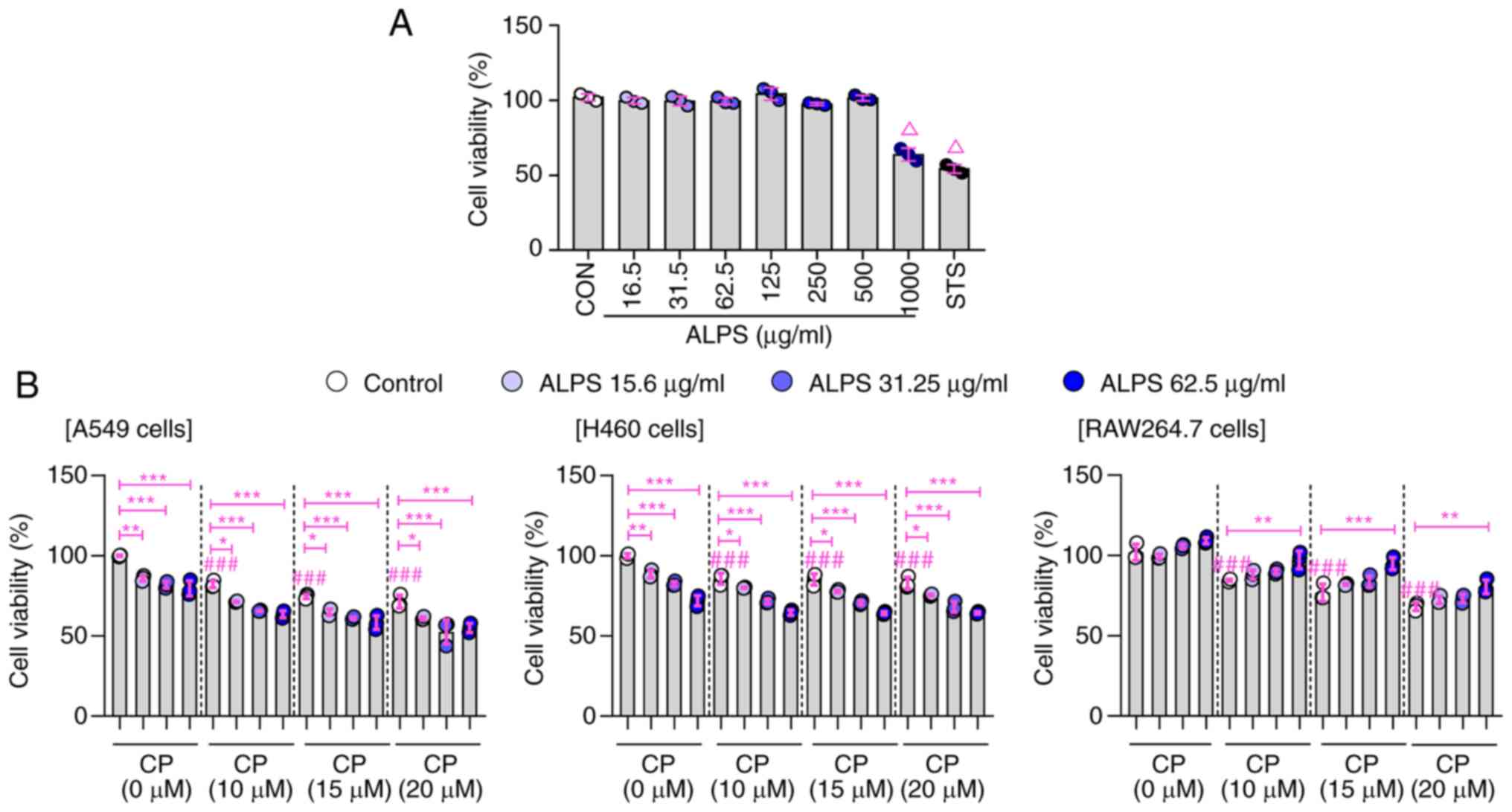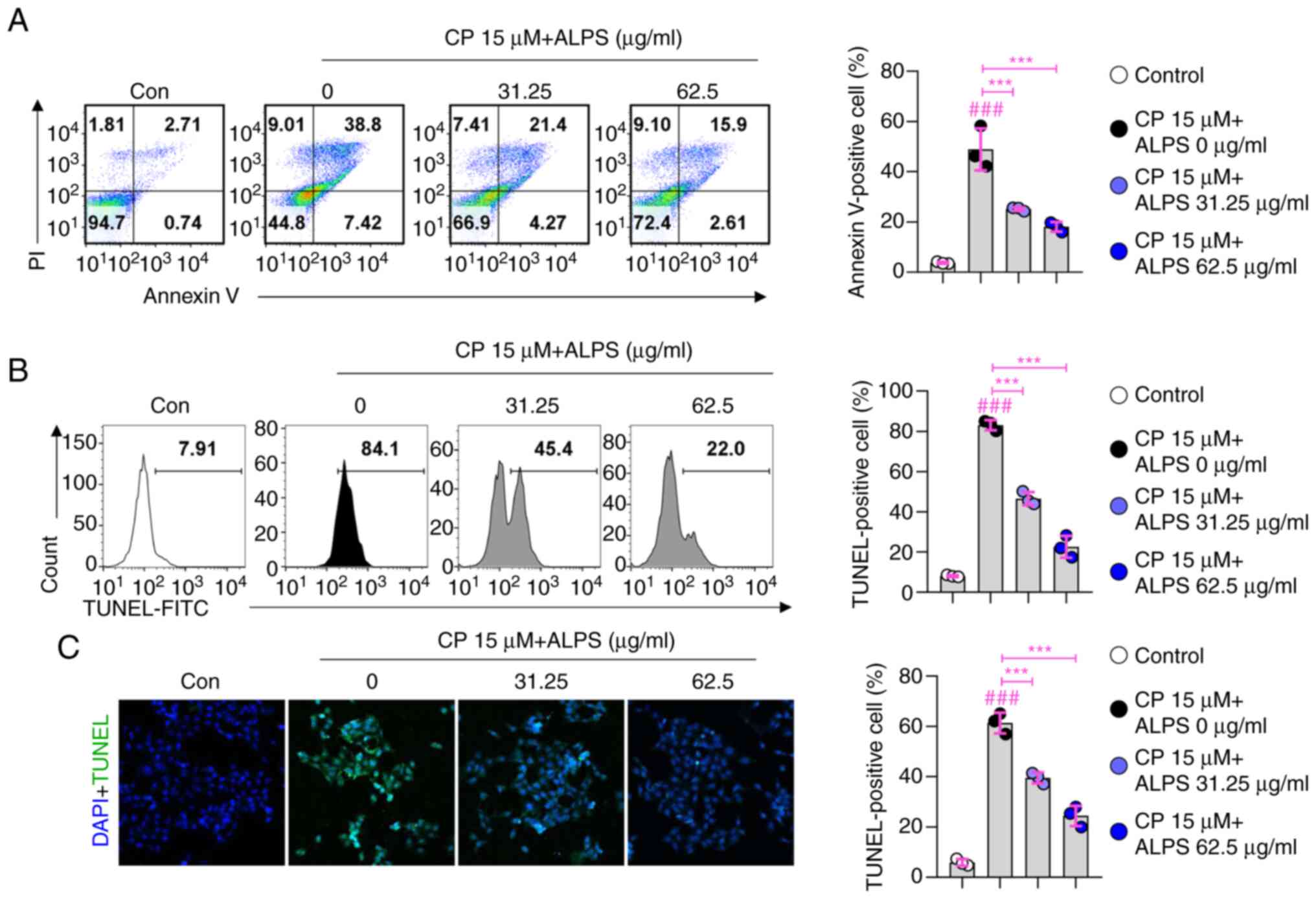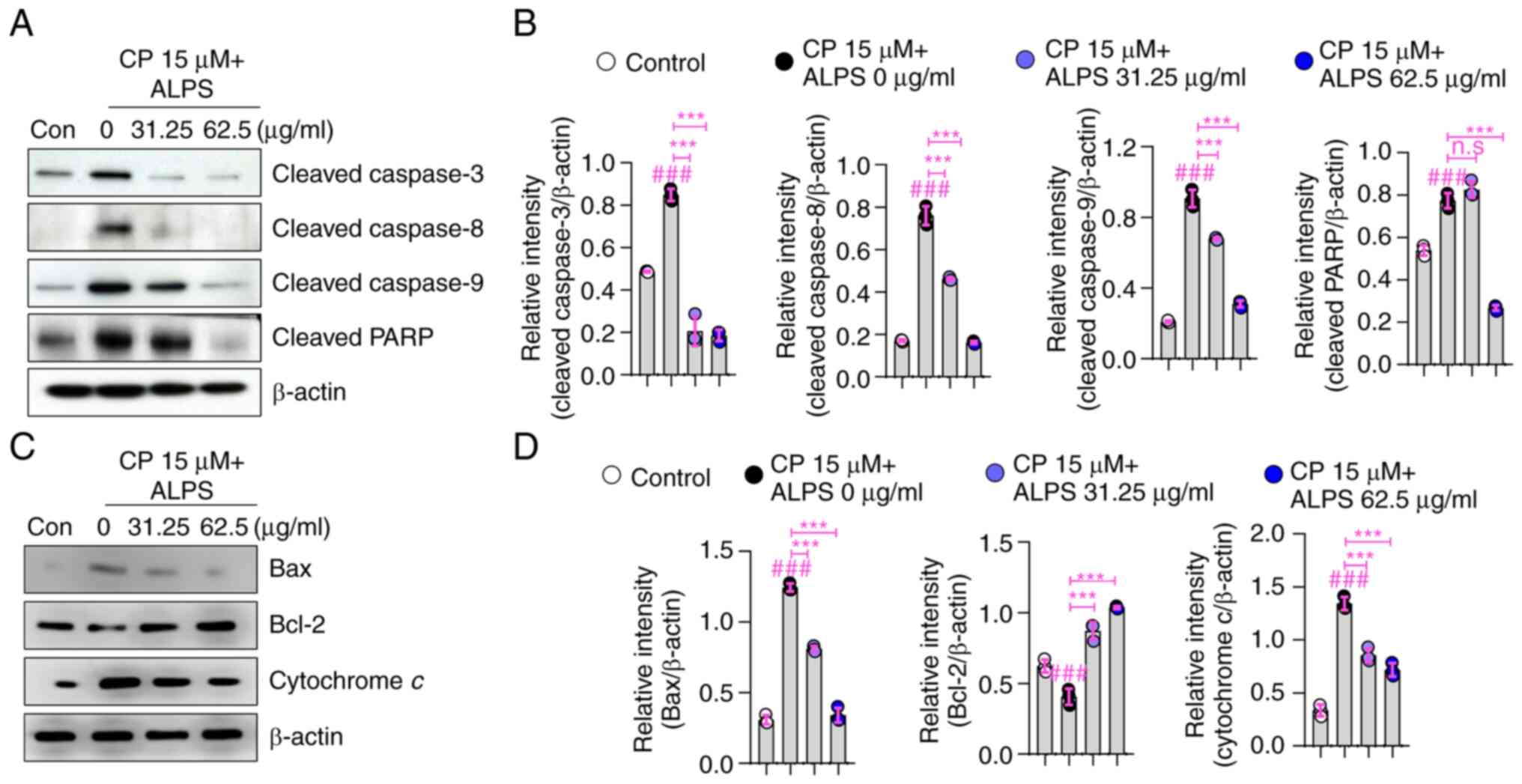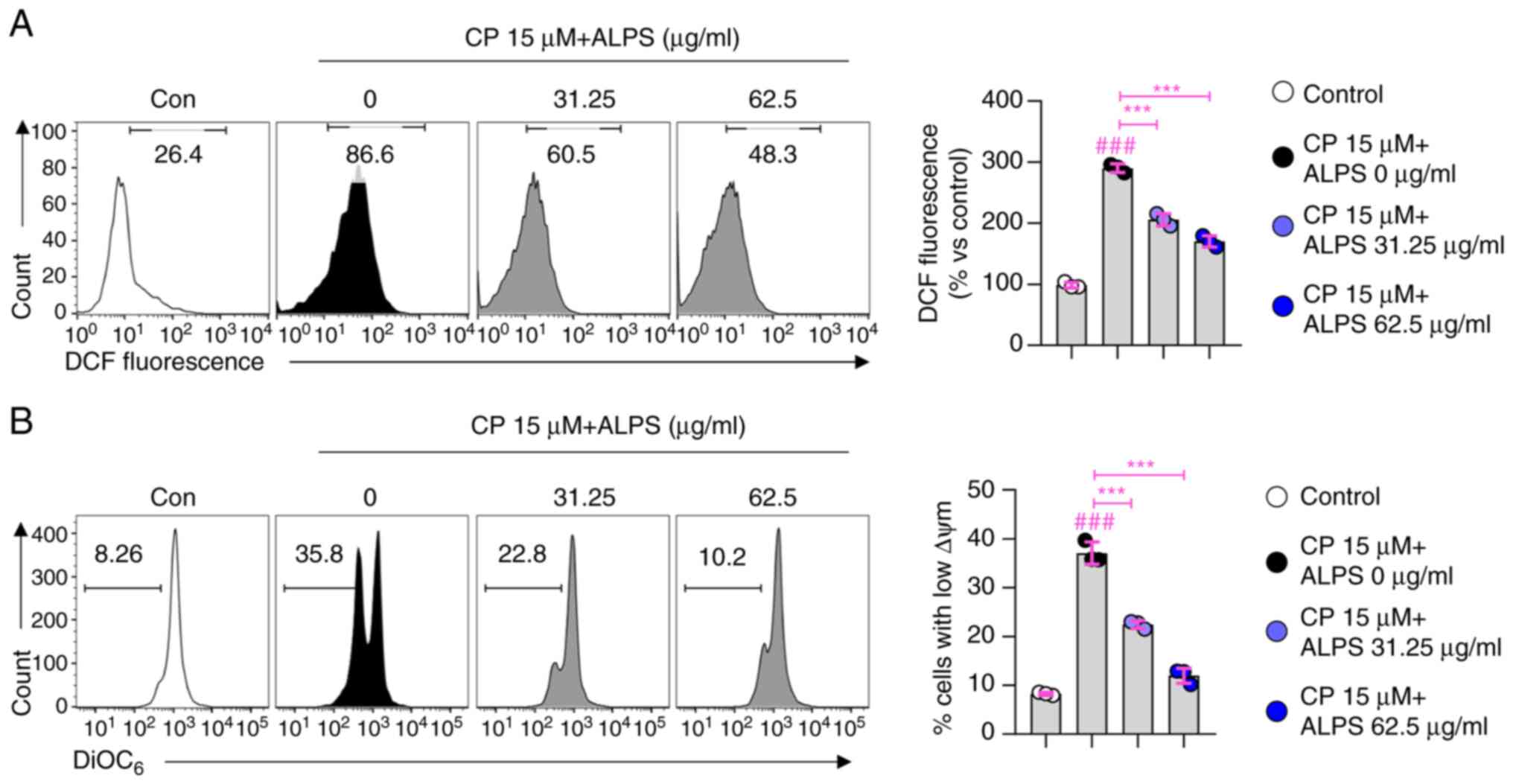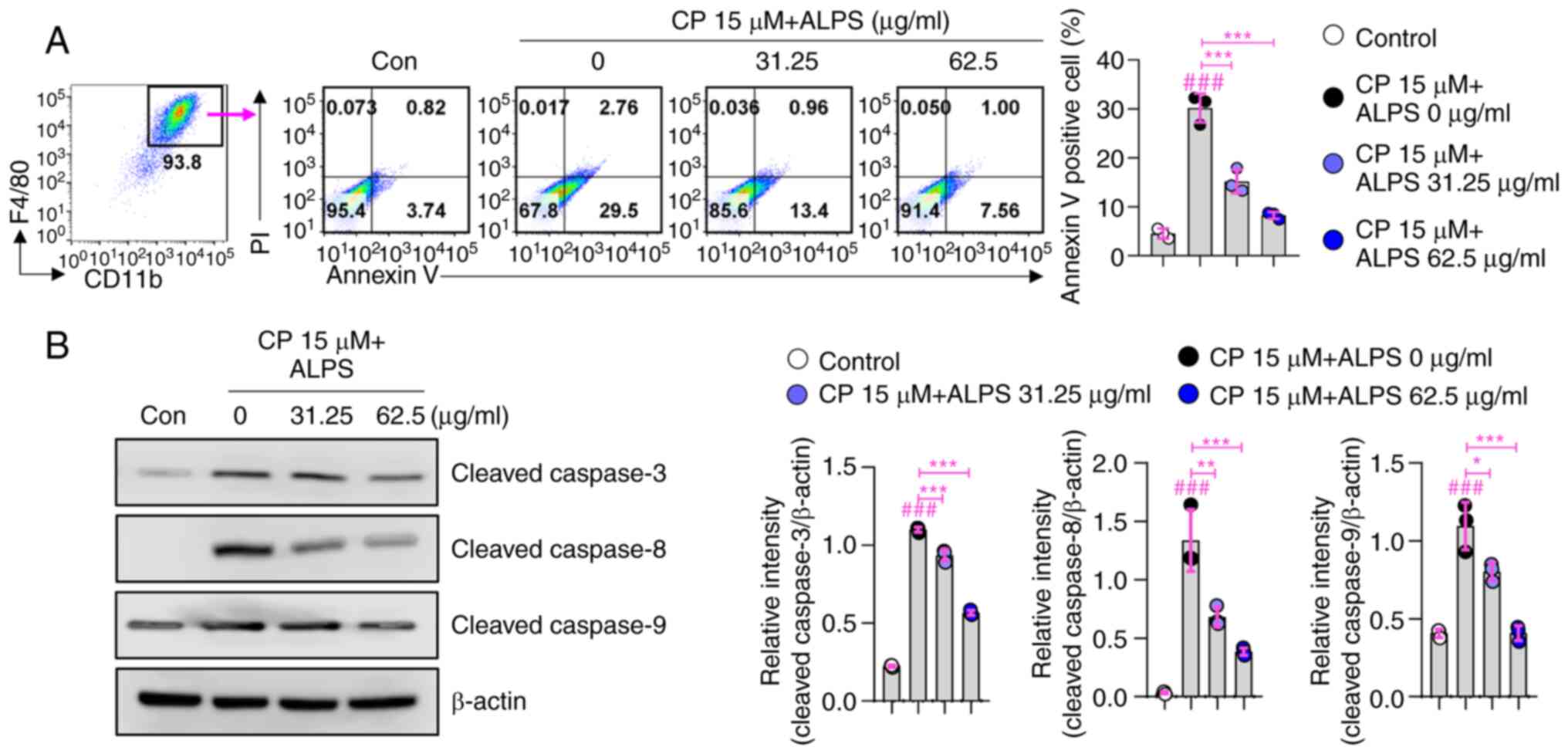|
1
|
Akazawa H: Cardiotoxicity of cancer
chemotherapy-mechanisms and therapeutic approach. Gan To Kagaku
Ryoho. 44:2058–2063. 2017.(In Japanese). PubMed/NCBI
|
|
2
|
Vineis P and Wild CP: Global cancer
patterns: Causes and prevention. Lancet. 383:549–557. 2014.
View Article : Google Scholar : PubMed/NCBI
|
|
3
|
Aiba K: Chemotherapy. Gan To Kagaku Ryoho.
31:706–711. 2004.(In Japanese). PubMed/NCBI
|
|
4
|
Rivankar S: An overview of doxorubicin
formulations in cancer therapy. J Cancer Res Ther. 10:853–858.
2014. View Article : Google Scholar : PubMed/NCBI
|
|
5
|
Knezevic CE and Clarke W: Cancer
chemotherapy: The case for therapeutic drug monitoring. Ther Drug
Monit. 42:6–19. 2020. View Article : Google Scholar : PubMed/NCBI
|
|
6
|
Hong BY, Sobue T, Choquette L, Dupuy AK,
Thompson A, Burleson JA, Salner AL, Schauer PK, Joshi P, Fox E, et
al: Chemotherapy-induced oral mucositis is associated with
detrimental bacterial dysbiosis. Microbiome. 7:662019. View Article : Google Scholar : PubMed/NCBI
|
|
7
|
Chen RL, Wang Z, Huang P, Sun CH, Yu WY,
Zhang HH, Yu CH and He JQ: Isovitexin potentiated the antitumor
activity of cisplatin by inhibiting the glucose metabolism of lung
cancer cells and reduced cisplatin-induced immunotoxicity in mice.
Int Immunopharmacol. 94:1073572021. View Article : Google Scholar : PubMed/NCBI
|
|
8
|
Zhu H, Luo H, Zhang W, Shen Z, Hu X and
Zhu X: Molecular mechanisms of cisplatin resistance in cervical
cancer. Drug Des Devel Ther. 10:1885–1895. 2016. View Article : Google Scholar : PubMed/NCBI
|
|
9
|
Ma Z, Xu L, Liu D, Zhang X, Di S, Li W,
Zhang J, Reiter RJ, Han J, Li X and Yan X: Utilizing melatonin to
alleviate side effects of chemotherapy: A potentially good partner
for treating cancer with ageing. Oxid Med Cell Longev.
2020:68415812020. View Article : Google Scholar : PubMed/NCBI
|
|
10
|
Pearce A, Haas M, Viney R, Pearson SA,
Haywood P, Brown C and Ward R: Incidence and severity of
self-reported chemotherapy side effects in routine care: A
prospective cohort study. PLoS One. 12:e01843602017. View Article : Google Scholar : PubMed/NCBI
|
|
11
|
Palipoch S, Punsawad C, Koomhin P and
Suwannalert P: Hepatoprotective effect of curcumin and
alpha-tocopherol against cisplatin-induced oxidative stress. BMC
Complement Altern Med. 14:1112014. View Article : Google Scholar : PubMed/NCBI
|
|
12
|
Liu Z, Huang P, Law S, Tian H, Leung W and
Xu C: Preventive effect of curcumin against chemotherapy-induced
side-effects. Front Pharmacol. 9:13742018. View Article : Google Scholar : PubMed/NCBI
|
|
13
|
Feng T, Yang X, Kong Q and Lu J:
Editorial: Food bioactive polysaccharides and their health
functions. Front Nutr. 8:7462552021. View Article : Google Scholar : PubMed/NCBI
|
|
14
|
Yu Q, Nie SP, Wang JQ, Liu XZ, Yin PF,
Huang DF, Li WJ, Gong DM and Xie MY: Chemoprotective effects of
Ganoderma atrum polysaccharide in cyclophosphamide-induced mice.
Int J Biol Macromol. 64:395–401. 2014. View Article : Google Scholar : PubMed/NCBI
|
|
15
|
Bao WR, Li ZP, Zhang QW, Li LF, Liu HB, Ma
DL, Leung CH, Lu AP, Bian ZX and Han QB: Astragalus polysaccharide
RAP selectively attenuates paclitaxel-induced cytotoxicity toward
RAW 264.7 cells by reversing cell cycle arrest and apoptosis. Front
Pharmacol. 9:15802018. View Article : Google Scholar : PubMed/NCBI
|
|
16
|
Byun EB, Song HY, Kim WS, Han JM, Seo HS,
Park SH, Kim K and Byun EH: Protective effect of polysaccharides
extracted from Cudrania tricuspidata fruit against
cisplatin-induced cytotoxicity in macrophages and a mouse model.
Int J Mol Sci. 22:75122021. View Article : Google Scholar : PubMed/NCBI
|
|
17
|
Paul J, Gnanam R, Jayadeepa RM and Arul L:
Anti cancer activity on graviola, an exciting medicinal plant
extract vs various cancer cell lines and a detailed computational
study on its potent anti-cancerous leads. Curr Top Med Chem.
13:1666–1673. 2013. View Article : Google Scholar : PubMed/NCBI
|
|
18
|
Hajdu Z and Hohmann J: An
ethnopharmacological survey of the traditional medicine utilized in
the community of Porvenir, Bajo Paraguá Indian Reservation,
Bolivia. J Ethnopharmacol. 139:838–857. 2012. View Article : Google Scholar : PubMed/NCBI
|
|
19
|
Oliveira AP, Sá I, Pereira DM, Gonçalves
RF, Andrade PB and Valentão P: Exploratory studies on the in vitro
anti-inflammatory potential of two herbal teas (Annona muricata L.
and Jasminum grandiflorum L.), and relation with their phenolic
composition. Chem Biodivers. 14:e17000022017. View Article : Google Scholar
|
|
20
|
Kim WS, Kim YE, Cho EJ, Byun EB, Park WY,
Song HY, Kim K, Park SH and Byun EH: Neuroprotective effect of
Annona muricata-derived polysaccharides in neuronal HT22 cell
damage induced by hydrogen peroxide. Biosci Biotechnol Biochem.
84:1001–1012. 2020. View Article : Google Scholar : PubMed/NCBI
|
|
21
|
Byun EB, Song HY and Kim WS:
Polysaccharides from Annona muricata leaves protect normal human
epidermal keratinocytes and mice skin from radiation-induced
injuries. Radiat Phys Chem. 170:1086722020. View Article : Google Scholar
|
|
22
|
Kim WS, Han JM, Song HY, Byun EH, Lim ST
and Byun EB: Annona muricata L.-derived polysaccharides as a
potential adjuvant to a dendritic cell-based vaccine in a
thymoma-bearing model. Nutrients. 12:16022020. View Article : Google Scholar : PubMed/NCBI
|
|
23
|
Zhang X, Goncalves R and Mosser DM: The
isolation and characterization of murine macrophages. Curr Protoc
Immunol. Chapter 14: Unit 14.1. 2008. View Article : Google Scholar
|
|
24
|
Eruslanov E and Kusmartsev S:
Identification of ROS using oxidized DCFDA and flow-cytometry.
Methods Mol Biol. 594:57–72. 2010. View Article : Google Scholar : PubMed/NCBI
|
|
25
|
Makovec T: Cisplatin and beyond: Molecular
mechanisms of action and drug resistance development in cancer
chemotherapy. Radiol Oncol. 53:148–158. 2019. View Article : Google Scholar : PubMed/NCBI
|
|
26
|
Marullo R, Werner E, Degtyareva N, Moore
B, Altavilla G, Ramalingam SS and Doetsch PW: Cisplatin induces a
mitochondrial-ROS response that contributes to cytotoxicity
depending on mitochondrial redox status and bioenergetic functions.
PLoS One. 8:e811622013. View Article : Google Scholar : PubMed/NCBI
|
|
27
|
Yang Y, Liu H, Liu F and Dong Z:
Mitochondrial dysregulation and protection in cisplatin
nephrotoxicity. Arch Toxicol. 88:1249–1256. 2014. View Article : Google Scholar : PubMed/NCBI
|
|
28
|
Hassan I, Chibber S and Naseem I:
Ameliorative effect of riboflavin on the cisplatin induced
nephrotoxicity and hepatotoxicity under photoillumination. Food
Chem Toxicol. 48:2052–2058. 2010. View Article : Google Scholar : PubMed/NCBI
|
|
29
|
Khalaf AA, Hussein S, Tohamy AF, Marouf S,
Yassa HD, Zaki AR and Bishayee A: Protective effect of Echinacea
purpurea (Immulant) against cisplatin-induced immunotoxicity in
rats. Daru. 27:233–241. 2019. View Article : Google Scholar : PubMed/NCBI
|
|
30
|
Hussain Y, Islam L, Khan H, Filosa R,
Aschner M and Javed S: Curcumin-cisplatin chemotherapy: A novel
strategy in promoting chemotherapy efficacy and reducing side
effects. Phytother Res. 35:6514–6529. 2021. View Article : Google Scholar : PubMed/NCBI
|
|
31
|
Kumar S and Tchounwou PB: Molecular
mechanisms of cisplatin cytotoxicity in acute promyelocytic
leukemia cells. Oncotarget. 6:40734–40746. 2015. View Article : Google Scholar : PubMed/NCBI
|
|
32
|
Dasari S and Tchounwou PB: Cisplatin in
cancer therapy: Molecular mechanisms of action. Eur J Pharmacol.
740:364–378. 2014. View Article : Google Scholar : PubMed/NCBI
|
|
33
|
Yu S, Gong LS, Li NF, Pan YF and Zhang L:
Galangin (GG) combined with cisplatin (DDP) to suppress human lung
cancer by inhibition of STAT3-regulated NF-κB and Bcl-2/Bax
signaling pathways. Biomed Pharmacother. 97:213–224. 2018.
View Article : Google Scholar : PubMed/NCBI
|
|
34
|
Zhao X, Xiang H, Bai X, Fei N, Huang Y,
Song X, Zhang H, Zhang L and Tong D: Porcine parvovirus infection
activates mitochondria-mediated apoptotic signaling pathway by
inducing ROS accumulation. Virol J. 13:262016. View Article : Google Scholar : PubMed/NCBI
|
|
35
|
Oyinloye BE, Adenowo AF and Kappo AP:
Reactive oxygen species, apoptosis, antimicrobial peptides and
human inflammatory diseases. Pharmaceuticals (Basel). 8:151–175.
2015. View Article : Google Scholar : PubMed/NCBI
|
|
36
|
Kleih M, Böpple K, Dong M, Gaißler A,
Heine S, Olayioye MA, Aulitzky WE and Essmann F: Direct impact of
cisplatin on mitochondria induces ROS production that dictates cell
fate of ovarian cancer cells. Cell Death Dis. 10:8512019.
View Article : Google Scholar : PubMed/NCBI
|















